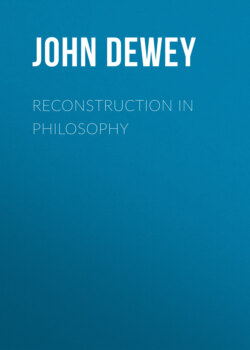Reconstruction in Philosophy

Реклама. ООО «ЛитРес», ИНН: 7719571260.
Оглавление
Джон Дьюи. Reconstruction in Philosophy
Reconstruction in Philosophy
Table of Contents
CHAPTER I
CHANGING CONCEPTIONS OF PHILOSOPHY
CHAPTER II
SOME HISTORICAL FACTORS IN PHILOSOPHICAL RECONSTRUCTION
CHAPTER III
THE SCIENTIFIC FACTOR IN RECONSTRUCTION OF PHILOSOPHY
CHAPTER IV
CHANGED CONCEPTIONS OF EXPERIENCE AND REASON
CHAPTER V
CHANGED CONCEPTIONS OF THE IDEAL AND THE REAL
CHAPTER VI
THE SIGNIFICANCE OF LOGICAL RECONSTRUCTION
CHAPTER VII
RECONSTRUCTION IN MORAL CONCEPTIONS
CHAPTER VIII
RECONSTRUCTION AS AFFECTING SOCIAL PHILOSOPHY
INDEX
Отрывок из книги
John Dewey
Published by Good Press, 2019
.....
If this lecture succeeds in leaving in your minds as a reasonable hypothesis the idea that philosophy originated not out of intellectual material, but out of social and emotional material, it will also succeed in leaving with you a changed attitude toward traditional philosophies. They will be viewed from a new angle and placed in a new light. New questions about them will be aroused and new standards for judging them will be suggested.
If any one will commence without mental reservations to study the history of philosophy not as an isolated thing but as a chapter in the development of civilization and culture; if one will connect the story of philosophy with a study of anthropology, primitive life, the history of religion, literature and social institutions, it is confidently asserted that he will reach his own independent judgment as to the worth of the account which has been presented today. Considered in this way, the history of philosophy will take on a new significance. What is lost from the standpoint of would-be science is regained from the standpoint of humanity. Instead of the disputes of rivals about the nature of reality, we have the scene of human clash of social purpose and aspirations. Instead of impossible attempts to transcend experience, we have the significant record of the efforts of men to formulate the things of experience to which they are most deeply and passionately attached. Instead of impersonal and purely speculative endeavors to contemplate as remote beholders the nature of absolute things-in-themselves, we have a living picture of the choice of thoughtful men about what they would have life to be, and to what ends they would have men shape their intelligent activities.
.....